Young man from Mosul focuses lens on new life in Finland
28 October 2016, by Marjanna Bergman
RASEBORG, Finland – When the death threats came, Ahmed Alalousi knew it was time to run. First, he went into hiding.
His instincts were correct. Shortly afterwards, gunmen arrived at his house.
“They tortured my brother but he didn’t tell them where I was,” he recalled in an interview with UNHCR, the UN Refugee Agency.
Since hardliners had arrived in his hometown of Mosul, northern Iraq in June 2014, people he knew had slowly disappeared. One by one, fellow journalists, friends and family had been threatened, tortured and even killed.
“I had no more tears to cry.”
“A friend in my class was shot on her way home from an exam, she was the only one taking care of her poor mother,” he said. “Another classmate was killed only 10 minutes after I walked with him in the street.
“People I know were killed every day. It happened so often that I had no more tears to cry.”
Their crimes? No one really knows.
He and his friends were training to be journalists and were often seen chatting animatedly over current affairs and injustice in society. That allowed some among the group, called Daesh by locals, to paint them as enemies.
He also performed regularly with a band and organised popular cultural events with friends – other activities frowned on by the newcomers.
Together with his parents and his brother’s family, he fled Iraq in December 2014. A car journey to Baghdad took them two days as they stuck to back roads.
From there they flew to Turkey where they struggled to make ends meet. Ahmed’s visa quickly expired. Through contacts he heard that people were treated fairly and equally in Finland and that the education system was one of the best in the world.
Ahmed’s dearest wish was to be able to complete his studies. An idea formed in his head – he must get to Finland and make that a reality.
In August 2015, he took the dangerous smuggler route across the Mediterranean to Europe.
On the flimsy inflatable dinghy to Greece, he realised his life vest was false. As the vessel took in water, he thought his “last moment had come” but they made it.
A two-week journey on foot, train and people smugglers’ cars then took him through Greece, the Former Yugoslav Republic of Macedonia, Serbia, Hungary, Austria, Germany, Denmark, Sweden and finally to Finland.
“I finally felt safe,” he said, “Then I just slept. I had been walking for so long; I just wanted it to end.”
In Finland, the 24-year-old Iraqi took full advantage of the opportunities which came his way. A talented photographer and media student, he had always dreamed of following in the footsteps of his hero, American photographer Michael Shainblum. He now set about putting that into practise.
Ahmed had bought his first camera in 2012 and entered a creative art competition at university, submitting the first photo he ever took. He won first prize.
“I thought it must be a mistake,” he said, laughing. There were more competitions, more prizes and his work was shown at exhibitions in Baghdad, then in Turkey, Tunisia and Morocco.
But he was keen to do much more and knew he needed to study. He found waiting for a decision on his refugee status frustrating.
“I’m not used to sitting around doing nothing,” he said. “My camera was left behind in Turkey and Finland was so cold and dark. But people were really nice, everybody tried to help me.”
Ahmed showed staff at the reception centre where he was staying some of the photos he had taken on his phone. They saw he had talent and called a local photographer Kjell Svenskberg.
Svenskberg asked Ahmed to go to his shop in the small coastal town of Ekenäs, about 90 km from Helsinki for a visit and liked what he saw.
“My employees were so impressed by Ahmed’s photos, they actually said that our photography is very similar,” recounted Svenskberg, 41.
Svenskberg took the young Ahmed under his wing. “I guess this was in a way my way of contributing, just being a friend, like taking Ahmed to a football game and out taking photos together. We both love photography and football so we are a perfect match.”
Svenskberg was acutely aware of what Ahmed had gone through to reach Finland. “I had seen what was happening on the news. It made me feel powerless. I was angry at the people that didn’t want to help.
Ahmed’s experience reminded Svenskberg of his own father’s stories about war.
“My father was only a small child living in Helsinki when bombs were falling over the city. He still dreams about it. He was evacuated and sent to Sweden as a war child. It could happen to anyone of us, we are no different.”
As word of Ahmed’s talent spread, a new life opened up. He landed his first job at the Finnish Museum of Photography, displayed his work at three photo exhibitions and collaborated with the rapper Qruu. Together they made a music video and tour schools to talk about the refugee crisis and what it means to be a refugee.
Nine months after arriving, Ahmed received news that his application for asylum had been granted. Finally, he was able to move out of the reception centre into his own rented flat and attend Finnish classes, the first step to getting back to his studies.
He still hopes to return to Mosul one day, together with his family, who are still waiting in Turkey for the war to end. “I miss my whole city, the people there, my old memories. I feel so far away from it.”
Page 1 of 5
-
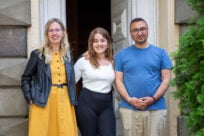
From pledge to good practice: The story of a refugee-led organization in Lithuania
12.12.2023During the Global Refugee Forum 2019, refugee communities in Lithuania came together, pledging to establish a refugee-led organization to strengthen refugee inclusion in the country. Four years later, the organization is helping refugees set up businesses in Lithuania and has become a positive example for others to follow. Scroll down to watch the video
-
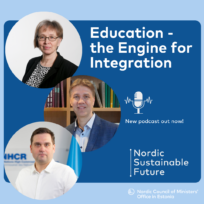
Education – an Engine for Integration
23.10.2023In a podcast on education and integration, experts from UNHCR, the UN Refugee Agency, the University of Tartu in Estonia and the University of Turku in Finland discuss and compare refugee students’ inclusion in education in the Nordic and Baltic countries.
-
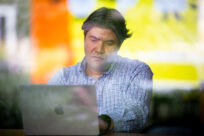
Refugee Fellowship Initiative in Lithuania provides professionals forced to flee with a key to the local labour market
23.10.2023The Refugee Fellowship Initiative set up by UNHCR, the UN Refugee Agency, the Lithuanian Diversity Charter, the Lithuanian Red Cross and four international organizations and companies is a win-win for both refugees and businesses. Scroll down to watch the video.
-
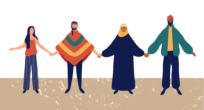
New tool guides practitioners to effective integration programmes
04.04.2023In November, UNHCR and the Migration Policy Group (MPG) launched the Toolkit for Effective Inclusion and Integration of Refugees in Estonia, the fifth country in the Nordic and Baltic region.
-
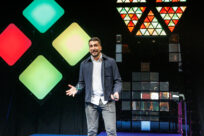
Startup founder and refugee: Mustafa in Finland provides education material for school children in Iraq
30.01.2023Mustafa Abdulameer, an Iraqi refugee in Finland, was adamant about using his skills and experience, and with a little support, he started his own company.
-

Legal support and social events ensure a helping hand to refugees from Ukraine
21.12.2022The Estonian Human Rights Centre is providing vital support to the many refugees from Ukraine who have arrived in Estonia since the war began.
-
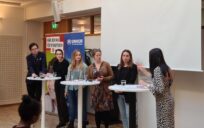
UNHCR and partners put new perspectives on integration in Sweden
10.11.2022UNHCR, Save the Children and the Swedish Red Cross co-organized a seminar on integration as a durable solution, bringing together actors, who work with integration and inclusion in various ways, to discuss the prerequisites for successful and sustainable integration.
-
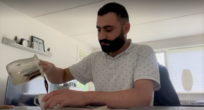
A Day in the Life of Massoud in Denmark
05.10.2022Meet 27-year-old Massoud from Syria as he shows us how to make Arabic coffee and talks about building a new life in Denmark.
-
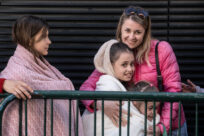
Refugees from Ukraine are eager to work but need sustained support to ensure inclusion
23.09.2022Most refugees from Ukraine are highly educated and willing to work and contribute to their host countries. But they need support to help ensure their socio-economic inclusion, concludes a survey by UNHCR.
-
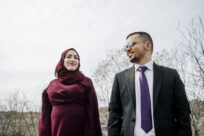
Finnish Refugee Council announces the Refugees of the Year 2022 in Helsinki
20.06.2022UNHCR’s partner Finnish Refugee Council has chosen Lama Kourdi, from Tampere, as the Refugee Woman of the year 2022. The Refugee Man of the year 2022 is Aladdin Delli, also from Tampere, Finland.
